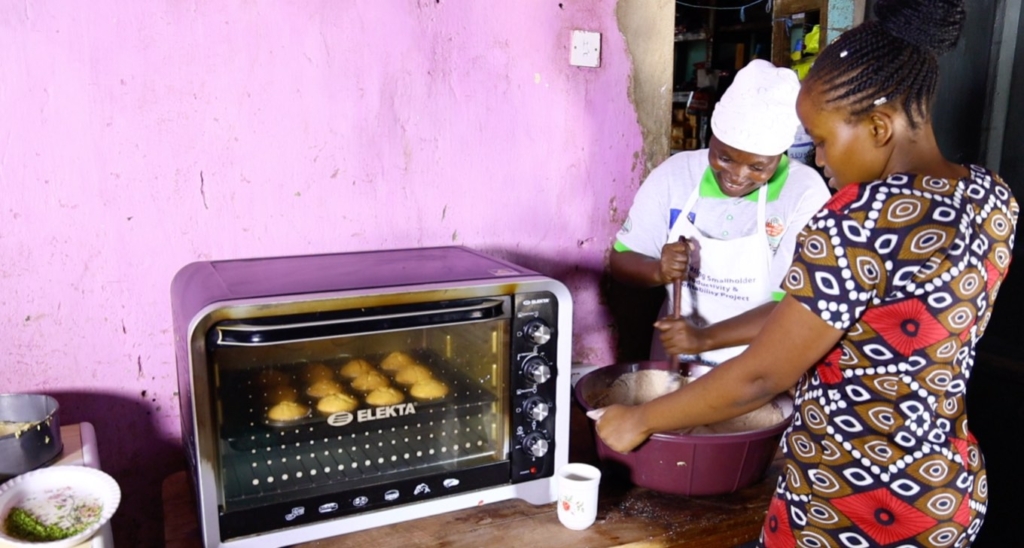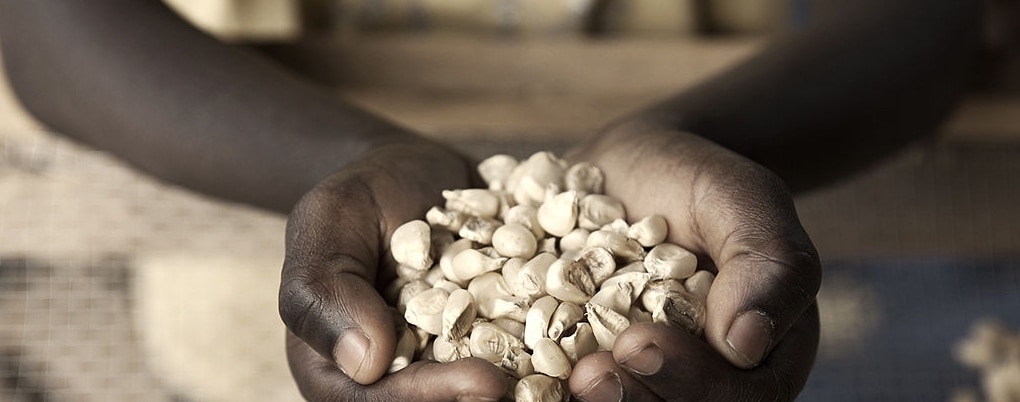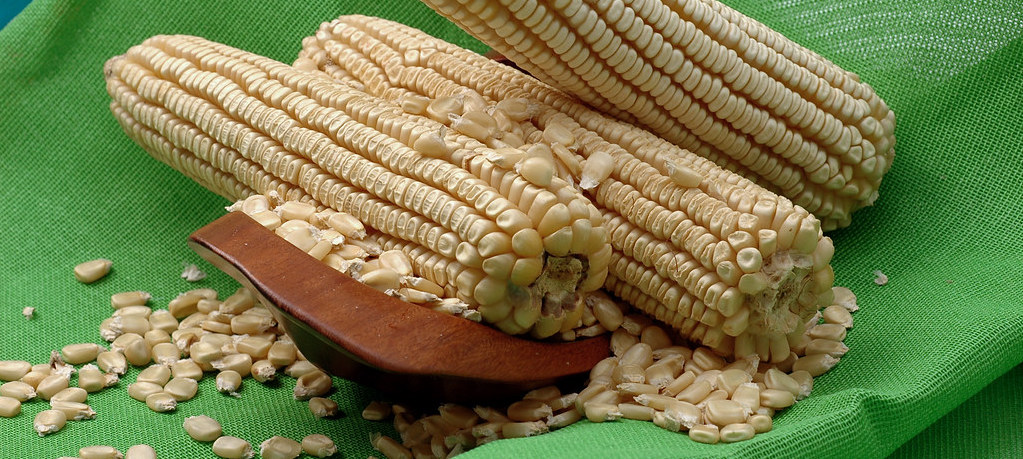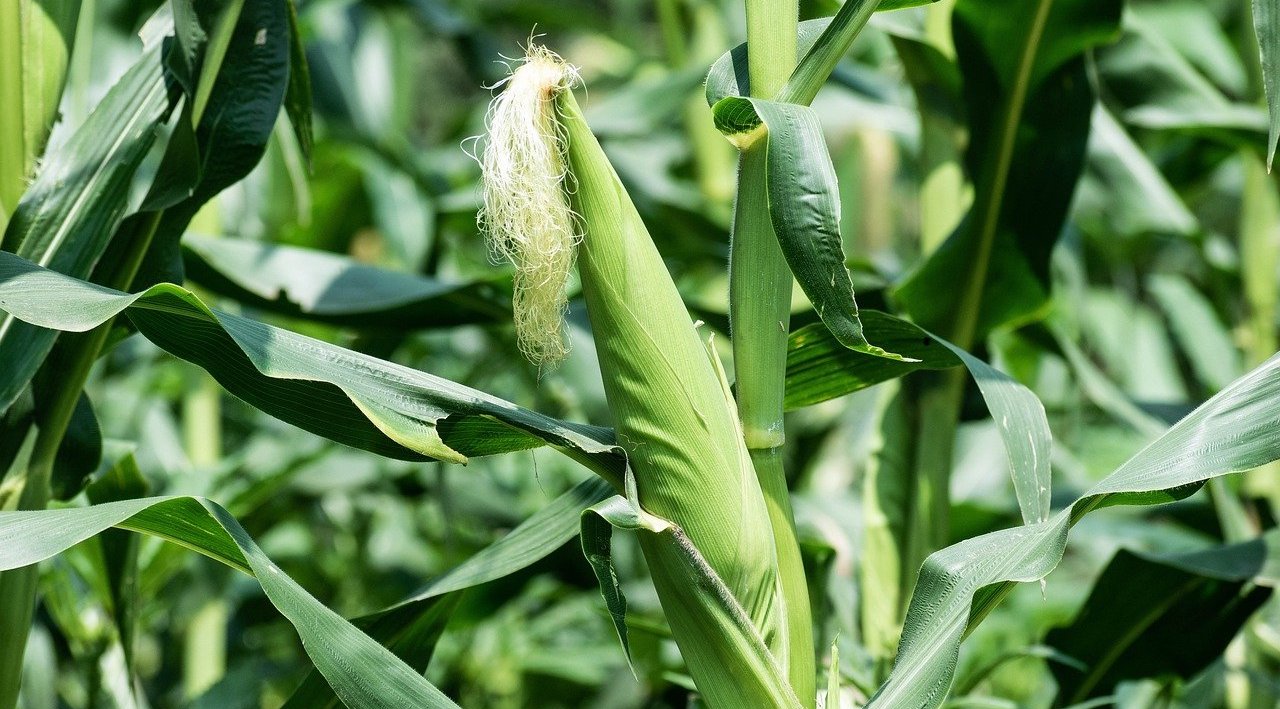Catherine Mbili, a VBA and a farmer with freshly harvested sorghum from her mother demo plot where she adopted regenerative agriculture practices. / Photo: CGA
For some years, smallholder farmers in Makueni County have had limited access to extension services, a reason attributed to the higher ratio of extension officers to farmers (a ratio of 1:1,099). Although agriculture remains the main economic activity in the region, access to agricultural services remain very low in Makueni as the county is estimated to have 193,531 farming households against 176 extensions officers. This situation has hindered most farmers from pacing up with the changing technological advances in agriculture and modern farming techniques that produces enough food. It has also posed a significant challenge for extension officers working under the Ministry of Agriculture, Irrigation, Livestock and Fisheries Development to reach all farmers within the County. The resultant low agricultural productivity has also resulted to limited participation in agricultural markets leading to occasional food insecurity, poor household nutrition and weak economic resilience among smallholder farmers.
Catherine Mbili, 47-year-old woman is a farmer and a Village Based Advisor (VBA) who educates farmers on Regenerative Agricultural (RA) practices in Mukolekya village, Kathonzweni Ward, Makueni sub – County, Makueni County. She acknowledges that for a long time she has faced difficulties to access agricultural services due to weak input and output market linkages.
When she heard about Regenerative Agriculture (RA), from the Cereal Growers Association (CGA) County Agribusiness Co-ordinator, Mbili was eager to participate. She says although she had practiced conservation agriculture in the past, her production was still low due to the depleted soil organic matter.
Scaling out Regenerative Agricultural Practices in Eastern Kenya, one of the Alliance for a Green Revolution in Africa (AGRA’s) initiative of transforming Africa’s smallholder farming to increase income and improve food security, is implemented by CGA. The project aims to improve food security, community and ecosystems resilience through adoption of regenerative agriculture and climate smart practices and technologies among smallholder farmers, and to strengthen the community-based public-private extension system in the county.
Mbili is one of the 114 Village Based Advisors (VBAs) who participated and facilitated RA training sessions conducted in the months of August – December 2020. The training sessions were conducted on their established mother demo plots for showcasing how to increase production through the use of Regenerative Agriculture practices such as minimum soil disturbance or zero tillage, cover cropping, intercropping (use of legumes), crop rotation, compositing, use of organic mulch, agroforestry, planting drought tolerant crops/certified seeds, soil and water conservation structures such as terraces and basins.
“I established a mother demo plot consisting of four plots and planted sorghum and green grams, where in one plot, I used the recommended RA practices, on the second plot I used manure, the third one I used fertilizer and on the fourth plot, I planted the same crop without any agronomic practice,” says Mbili.
She added, “The yields from the plots varied, the first plot had high production, the second one had less production, the third one had lesser production while the fourth plot had very low yields because I did not apply any RA practices”.
As a result of applying Regenerative Agriculture (RA) practices in the first plot, Mbili harvested 70 kilograms of sorghum from a 10 by 15 metres mother demo plot, 20 kilograms from the second plot, 5 kilograms from the third plot. She however, did not harvest anything from the fourth plot where she did not practice Regenerative Agriculture (RA).
“Before, I was trained on RA by CGA, my yields were still low, but now there is a big difference. Even with the minimal rains received twice during planting; the yields are good where I used the regenerative agriculture practices” says Mbili. “I have had about 40% increase in crop yields” she added.
As a result of the success of the mother demonstration plots, 171 farmers have been reached through trainings and open field days by Mbili who have expressed interest in practicing Regenerative Agriculture (RA) practices the following rainy season.
To ensure farmers are receptive to farming practices on demonstration plots their results are compared to those of plots where conventional farming practices is applied. The conventional farming practices have lower production. That makes it easier to convince farmers to adopt the new practices incorporating regenerative agriculture practices.
Through CGA’s training and extension support facilitated by the county extension agents and value chain actors to provide other farm level service lines ranging from best agronomic practices, crop protection, crop care and value addition to other diversified services to promote business sustainability among farmers, Mbili developed entrepreneurial skills and was linked to agriculture Value Chain Actors (VCA) in 2020. Mbili now trains farmers and helps them obtain products or services needed at a fee/commission.
“I did ripping for 55 farmers and earned a commission of KES 200 per acre. I also ordered and sold 100 kilograms of pigeon peas seed at KES 100 per kilogram and earned a commission of KES 30 per kilogram” Mbili said.
Besides that, Mbili has found a lifeline in adding value to the produce she harvests. This has helped her to open a shop where she sells cakes made from the traditional high value crops, majorly sorghum and fruit juice.
“Now I’m officially a business owner. My dream has come true. I can work and make a living while making other people’s days a little brighter,” said Mbili as she stood next to an oven of her creamy creations. “I would not have been able to do it without this support,” Mbili added, who has now increased her monthly income from KES 15,000 to KES 43,000.

mother demo plot. Photo: CGA
“I now have enough food, able to support in paying school fees and settle health bills for my two children with the income I receive from my business and commissions that I earn by aggregating demand for farm inputs through linkage to input suppliers” says Mbili.
Through the VBA approach as a vehicle for driving the regenerative agriculture in initiative, AGRA is creating self-employment opportunities for Village-Based Advisors (VBA) to advice small-holder farmers on regenerative agriculture and aggregate farm demand supply of inputs.
As a result of the success recorded from the 127 demonstration plots established by the 114 VBAs showcasing RA practices and technologies, a majority of the over 14,005 farmers were trained through the mother demo plots, peer to peer learning visits and open field days. The farmers have been able to establish 620 baby demonstration plots and with 5,240 adopting Regenerative Agriculture (RA) practices in the first rainy season of 2021.






